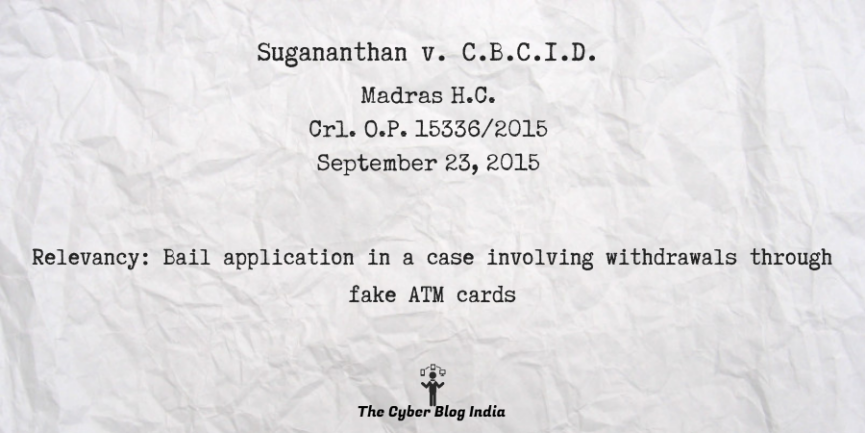Sugananthan v. C.B.C.I.D.

Sugananthan v. C.B.C.I.D.
In the High Court of Madras
Crl. O.P. 15336/2015
Before Justice P.N. Prakash
Decided on September 23, 2015
Relevancy of the case: Bail application in a case involving withdrawals through fake ATM cards
Statutes and Provisions Involved
- The Information Technology Act, 2000 (Sections 66, 66B, 66C)
- The Indian Penal Code, 1860 (Sections 120B, 380, 420, 465, 468, 471, 511)
- The Foreigners Act, 1946 (Section 3(2)(e), 14)
- The Code of Criminal Procedure, 1973 (Section 241)
Relevant Facts of the Case
- The petitioners were attempting to withdraw money using fake ATM cards at a bank situated inside the Chennai Domestic Airport.
- They were granted bail on the condition of providing two sureties each. It was discovered that they had all given bogus sureties and thus, were re-arrested.
- The Tamil Nadu Government lodged the accused in a Special camp exercising its powers under section 3(2)(e) of the Foreigners Act, 1946. However, the petitioners prayed to the court to permit them to stay in the house of a Sri Lankan national. The court granted the request on the condition of them having to appear before the police at specified times, and prohibiting them to travel abroad without the permission of the court.
- The petitioners defaulted in compliance with the conditions. The police requested the court to cancel their bail, however since they were not at the house, the court was not able to serve them notice for the same.
- They were caught by the West Bengal Police under Section 14 of the Foreigners Act when they illegally tried to go to Bangladesh and were bought before a Magistrate. They were sentenced under Section 241 of the Code of Criminal Procedure, 1973 along with Section 14 of the Foreigners Act, 1946.
Prominent Arguments by the Advocates
- The petitioners’ counsel argued that look out circulars can only be issued against Indian nationals, not foreigners.
Opinion of the Bench
- The judgements relied on by the counsel were cases of Indian nationals who had been arrested and were out on bail, and sought permission for suspension of the lookout notice on grounds of health conditions or that they were to report before their foreign employers, otherwise they’d lose their jobs. The prior conduct of the petitioners showed that if not for the look-out notice, the accused would have slipped out of India long back.
Final Decision
- The petition was dismissed.
This case summary has been prepared by Akshita Rohatgi, an undergraduate student at University School of Law and Legal Studies, GGSIPU, during her internship with The Cyber Blog India in January/February 2021.
